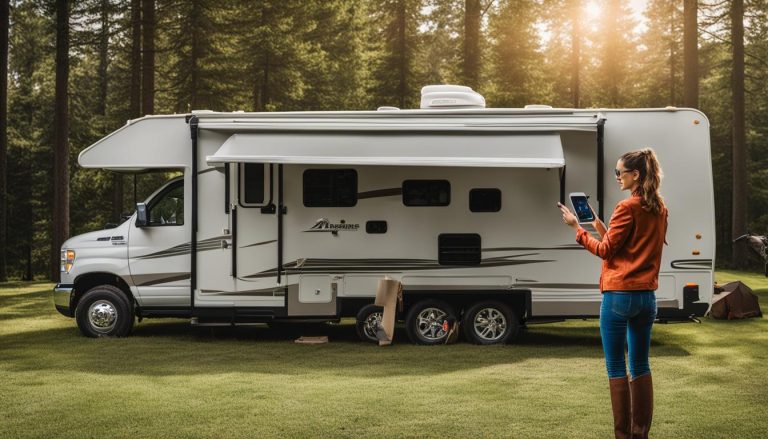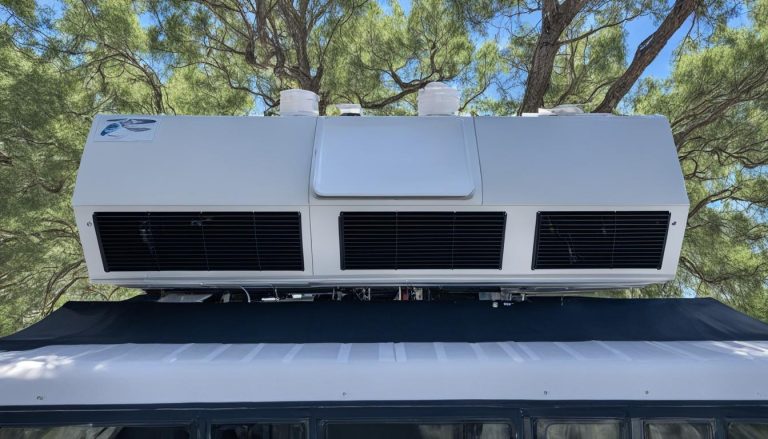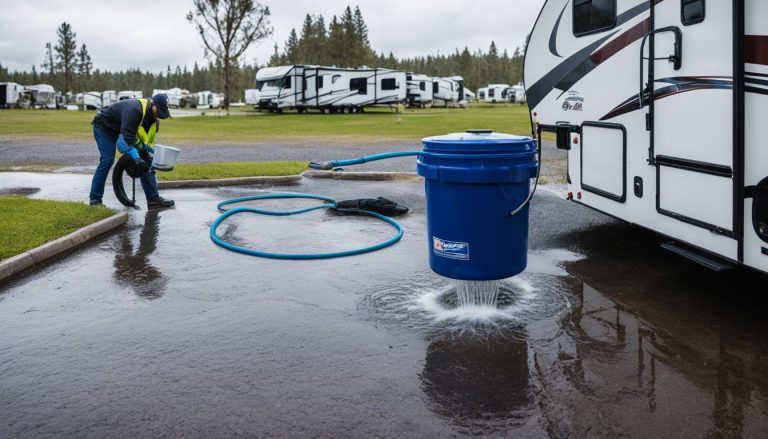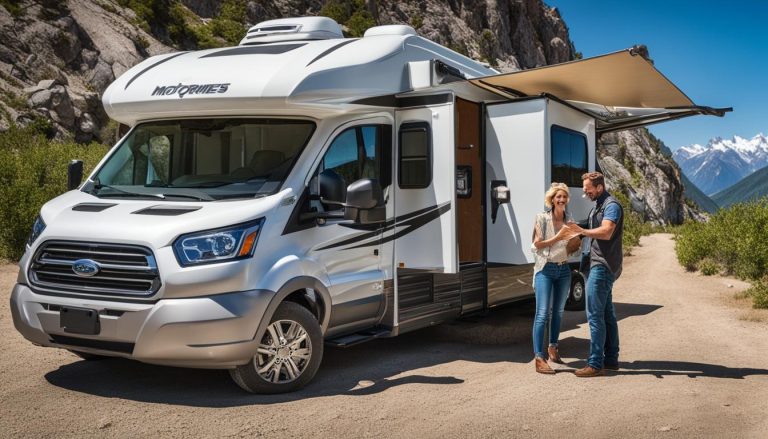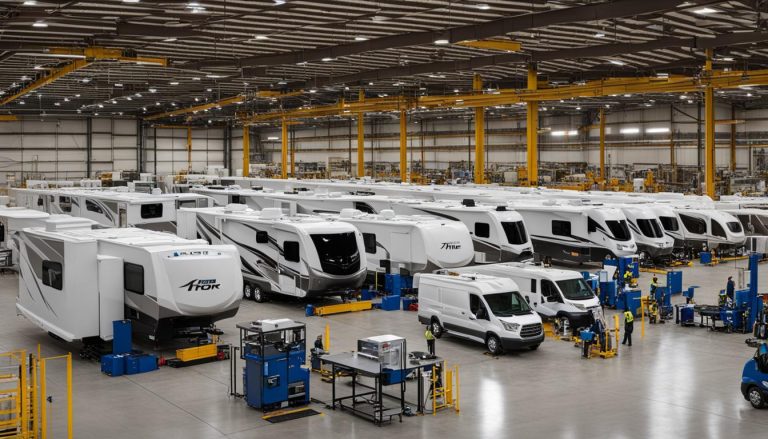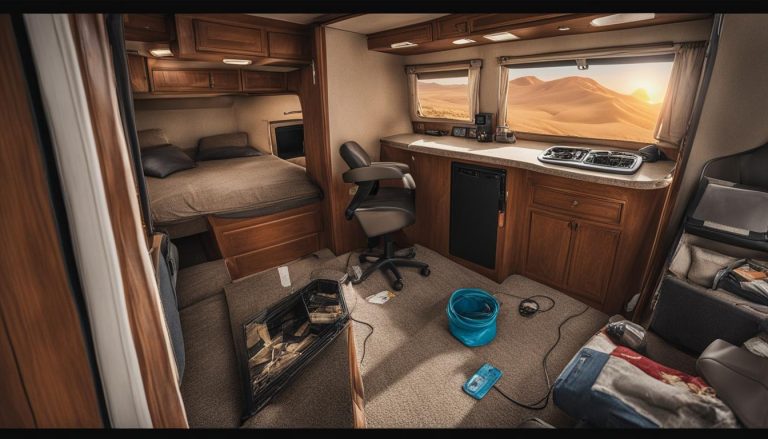RV Hookup Guide: Master How to Hook Up an RV
gorvlifestyle.com and its partners may earn a commission if you purchase a product through one of our links
Embark on your RV adventure with confidence! Discover essential tips for how to hook up an RV with our comprehensive step-by-step guide. In this beginner’s guide to RV hookups, we will explore the different types of hookups available, delve into the specifics of water, electrical, and sewer connections, discuss safety considerations, and troubleshoot common issues. By the end of this guide, you will be equipped with the knowledge to confidently navigate and utilize RV hookups during your travels.
Key Takeaways:
- Learn how to hook up an RV safely and efficiently.
- Familiarize yourself with the different types of RV hookups, including water, electrical, and sewer connections.
- Understand the importance of following proper procedures for water, electrical, and sewer hookups.
- Discover troubleshooting tips to overcome common issues that may arise during RV hookups.
- Gain the confidence to enjoy a comfortable and convenient RV camping experience.
Understanding RV Hookups: A Beginner’s Guide
Embarking on an RV camping adventure opens up a world of possibilities for experiencing the great outdoors. To fully embrace this nomadic lifestyle, it’s important to understand the ins and outs of RV hookups. RV hookups provide essential connections to water, electricity, and sewer systems, allowing you to enjoy the comforts of home while on the road.
As a beginner, navigating the world of RV hookups can feel overwhelming. That’s why we’ve put together this comprehensive guide to help you get started. In this section, we’ll explore the various types of RV hookups, discuss their importance, and provide valuable tips for a successful camping experience.
The Three Types of RV Hookups
RV hookups can be categorized into three main types: water hookups, electrical hookups, and sewer hookups.
“RV hookups provide access to water, electricity, and sewer connections, enabling a self-sustaining camping experience.”
Water hookups allow you to access clean water for cooking, cleaning, and hygiene purposes. They typically consist of a water spigot or faucet that connects directly to your RV.
Electrical hookups provide the power needed to run your RV’s appliances, devices, and lighting systems. These hookups often come in different amp options, so it’s crucial to understand the specific requirements of your RV.
Sewer hookups are responsible for the disposal of waste from your RV’s toilet and sinks. They facilitate the safe and sanitary removal of graywater and blackwater from your vehicle.
Tips for a Successful RV Hookup Experience
Now that you have an overview of the different types of RV hookups, let’s delve into some essential tips to ensure a smooth and enjoyable camping experience:
- Always carry a variety of RV-specific adapters and extension cords to accommodate different campground setups and electrical requirements.
- Prioritize safety by using surge protectors and circuit breakers to safeguard your RV’s electrical system.
- Make sure to level your RV before connecting to water and sewer hookups to prevent leaks and other issues.
- Invest in a quality sewer hose and never use it for any purpose other than dumping waste.
- Regularly sanitize your freshwater tank to ensure clean and safe drinking water.
- Familiarize yourself with campground rules and regulations regarding hookups, disposal stations, and usage restrictions.
By following these tips, you’ll be well-prepared to navigate the world of RV hookups and enjoy a stress-free camping experience.
Next, we’ll dive deeper into the specific types of RV hookups, starting with water hookups. Stay tuned!
Types of RV Hookups
When it comes to RV camping, understanding the different types of hookups is crucial for a smooth and enjoyable experience. RV hookups can be categorized into three main types: water hookups, electrical hookups, and sewer hookups. Let’s explore each type in more detail:
Water Hookups
Water hookups provide clean and fresh water for various purposes during your RV camping trip. Whether it’s cooking, cleaning, or flushing, having a reliable water hookup is essential. When connecting to a water hookup, make sure to use a drinking water-safe hose and a pressure regulator to prevent any damage to your RV’s plumbing system.
Electrical Hookups
Electrical hookups supply power to your RV and allow you to power up your appliances, charge your devices, and have all the electrical amenities you need. It’s important to understand the electrical requirements of your RV and the available electrical hookup options at the campground. Different campgrounds may offer 30-amp, 50-amp, or even 100-amp electrical hookups. It’s crucial to have the appropriate RV power cord and adapters for a safe and reliable electrical connection.
Sewer Hookups
Sewer hookups are necessary for disposing of waste from your RV’s toilet and sinks. Connecting your RV to a sewer hookup allows for convenient waste removal and ensures a clean and hygienic camping experience. When connecting to a sewer hookup, always use a proper RV sewer hose and follow the campground’s guidelines for waste disposal.
By understanding the different types of RV hookups – water hookups, electrical hookups, and sewer hookups, you’ll be well-equipped to make the most of your RV camping experience. Whether you’re enjoying a hot shower, powering up your favorite devices, or effortlessly disposing of waste, having a solid understanding of these hookups will make your trip more comfortable and enjoyable.
Water Hookups: Understanding Freshwater, Graywater, and Blackwater
Water hookups are essential for accessing clean water in your RV. When you arrive at a campground or RV park, connecting to water hookups ensures a steady supply of water for various activities during your trip. Understanding the different types of water hookups—freshwater, graywater, and blackwater—is crucial for a successful and comfortable RV camping experience.
Freshwater Hookups
Freshwater hookups provide clean water for cooking, cleaning, and flushing in your RV. These hookups supply your onboard water system with fresh, potable water. When connecting your RV to a freshwater hookup, ensure that your water hose is specifically designed for drinking water and approved for RV use. This will help maintain the quality and safety of the water supply.
To connect to a freshwater hookup:
- Locate the freshwater hookup connection point on your RV.
- Attach one end of the drinking water hose to the hookup point on your RV.
- Connect the other end of the hose to the campground’s freshwater supply.
- Turn on the freshwater supply tap slowly to avoid sudden surges of water pressure.
- Check for any leaks and ensure a secure connection.
Graywater Hookups
Graywater hookups handle wastewater from sinks, showers, and appliances, excluding the toilet. It is important to note that graywater should never be disposed of on the ground or in open areas. Instead, it should be directed to designated graywater hookups or dump stations provided by the campground or RV park.
When connecting your RV to a graywater hookup:
- Identify the graywater hookup connection point on your RV.
- Attach a suitable hose or pipe to the graywater outlet.
- Direct the other end of the hose or pipe to the designated graywater hookup or dump station.
- Ensure a secure connection to avoid any leaks.
Blackwater Hookups
Blackwater hookups are used for disposing of waste from your RV’s toilet. It is important to handle blackwater with care and follow proper sanitation practices to ensure hygiene and prevent contamination.
When connecting your RV to a blackwater hookup:
- Locate the blackwater outlet on your RV.
- Securely attach a suitable sewer hose to the blackwater outlet.
- Connect the other end of the sewer hose to the campground’s designated sewer hookup or dump station.
- Ensure a tight and secure connection, using appropriate fittings if necessary.
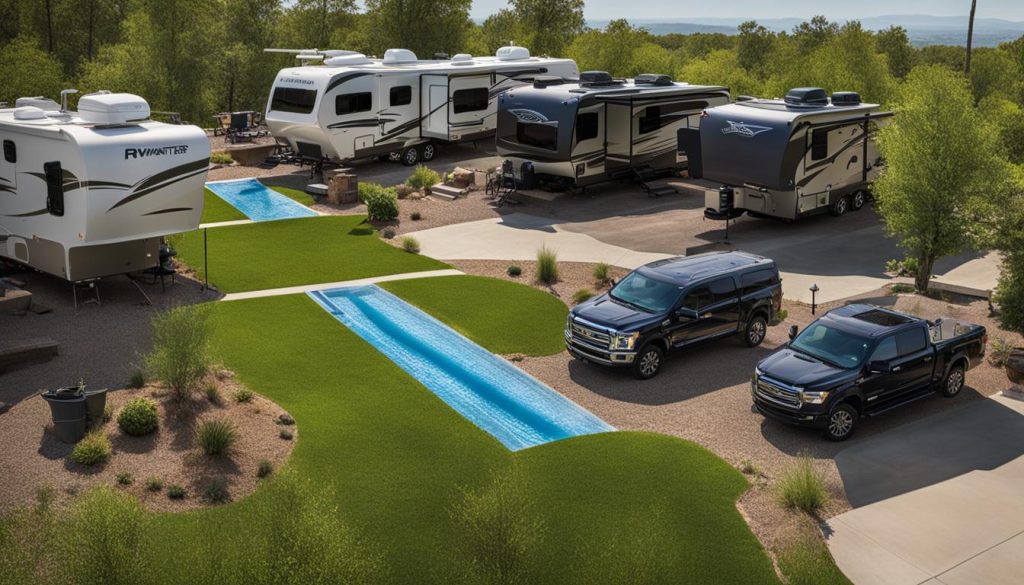
Understanding the different types of water hookups—freshwater, graywater, and blackwater—allows you to properly connect and utilize these essential RV facilities. By following the appropriate procedures for each hookup type, you can ensure a seamless and enjoyable camping experience without compromising on basic necessities.
| Water Hookup Type | Description |
|---|---|
| Freshwater | Provides clean water for cooking, cleaning, and flushing in your RV. |
| Graywater | Handles wastewater from sinks, showers, and appliances, excluding the toilet. |
| Blackwater | Used for disposing of waste from your RV’s toilet. |
Electrical Hookups: Amps, Volts, and Shore Power
When it comes to powering your RV, electrical hookups play a crucial role. Understanding the concepts of amps, volts, and shore power will ensure that you can properly utilize electrical connections and avoid any potential issues.
First, let’s talk about amps. Amps refer to the amount of electrical current available to power your RV’s appliances, devices, and systems. It’s important to know the amp rating of your RV’s electrical system to avoid overloading it. Most RVs have a standard amp rating of 30 or 50 amps, but it’s essential to check your specific RV’s manual or electrical panel for the correct rating.
Pro tip: When connecting your RV to an electrical hookup, make sure that the campground’s electrical supply can match or exceed your RV’s amp rating. This will ensure that you have enough power available to run all of your appliances and devices without any issues.
Next, let’s discuss volts. Volts represent the pressure or force behind the electrical current. In the United States, most campground electrical hookups provide 120 volts of power. However, some campgrounds may offer 240-volt hookups for larger RVs or specific electrical needs. It’s crucial to know the voltage rating of the campground’s electrical supply and ensure that your RV’s electrical system is compatible.
Pro tip: Investing in a reliable surge protector is a wise decision to protect your RV’s electrical system from power surges and fluctuations. A surge protector will help prevent any potential damage to your appliances and devices due to unstable or excessive voltage.
Lastly, let’s explore shore power. Shore power refers to the connection that brings electricity from the campground’s power supply to your RV. It enables you to access the electrical grid and power your RV’s electrical system while camping. Shore power connections usually consist of a weatherproof electrical inlet on the outside of your RV and a power cord that plugs into the campground’s electrical pedestal.
Successfully utilizing electrical hookups requires understanding the concepts of amps, volts, and shore power. By knowing your RV’s amp rating, checking the campground’s electrical supply, and ensuring voltage compatibility, you can confidently enjoy all the comforts and conveniences that electrical hookups provide.
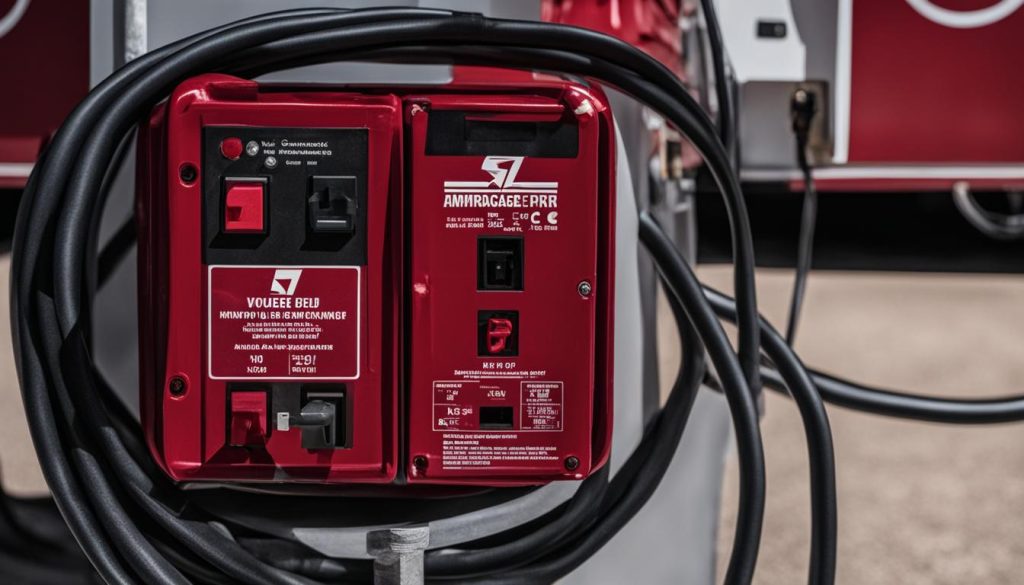
| Amps | Volts | Shore Power |
|---|---|---|
| 30 or 50 amps | 120 volts (some campgrounds offer 240 volts) | Connection from campground’s power supply to RV |
Sewer Hookups: Dumping and Sanitation Tips
Sewer hookups are an essential part of your RV’s waste management system, allowing you to properly dispose of waste from the toilet. To maintain a clean and hygienic RV system, it is crucial to follow proper dumping and sanitation practices.
First and foremost, always use RV-friendly toilet paper that easily dissolves in water. This will help prevent clogs and ensure smooth flow through the sewer system. Avoid flushing any other items besides toilet paper and human waste, as they can cause blockages and damage the system.
When it’s time to dump your RV’s waste, make use of designated dump stations. These stations are specifically designed for waste disposal and have the necessary facilities to handle it safely. It’s important to follow any guidelines or regulations set by the campground or RV park regarding waste disposal.
Remember to wear gloves when handling sewer hoses to protect yourself from any potential contamination. After each use, thoroughly clean and sanitize the hoses and other components of the sewer system to maintain hygiene.
FAQ
What are RV hookups?
RV hookups are connections that provide access to water, electricity, and sewer connections, allowing for a self-sustaining camping experience in an RV.
How many types of RV hookups are there?
There are three main types of RV hookups: water hookups, electrical hookups, and sewer hookups.
What is the purpose of water hookups?
Water hookups provide clean water for cooking, cleaning, and flushing in your RV.
What are the different types of water hookups?
The different types of water hookups are freshwater hookups, graywater hookups, and blackwater hookups.
What is the purpose of electrical hookups?
Electrical hookups supply power to your RV for running appliances and charging devices.
What do amps and volts refer to in electrical hookups?
Amps refer to the amount of electrical current available, while volts represent the pressure or force behind that current.
What is shore power?
Shore power is the connection that brings electricity from the campground’s power supply to your RV.
What is the purpose of sewer hookups?
Sewer hookups enable the disposal of waste from the RV’s toilet and sinks.
What are some important dumping and sanitation tips for sewer hookups?
It is crucial to use RV-friendly toilet paper, avoid flushing anything other than toilet paper and human waste, utilize designated dump stations, and wear gloves when handling sewer hoses.

